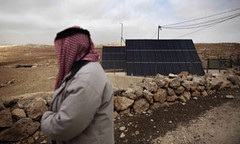Israel is planning to demolish 'illegal' solar panels that are the only source of electricity for Palestinians in West Bank villages.
Two large solar panels jut out of the barren landscape near Imneizil in the Hebron hills. The hi-tech structures sit incongruously alongside the tents and rough stone buildings of the Palestinian village, but they are fundamental to life here: they provide electricity.
Imneizil is not connected to the national electricity grid. Nor are the vast majority of Palestinian communities in Area C, the 62% of the West Bank controlled by Israel. The solar energy has replaced expensive and clunky oil-powered generators.
According to the Israeli authorities, these solar panels – along with six others in nearby villages – are illegal and have been slated for demolition.
Nihad Moor, 25, has three small children. The family live in a two-room tent kitted out with a fridge, TV and very old computer. She also has a small electric butter churn, which she uses to supplement her husband's small income from sheep farming. "The kids get sick all the time. At the moment, because of a change in the weather, they all have colds. Without electricity I wouldn't even be able to see to help them when they need to use the [outdoor] toilet at night," Moor says. "I don't want to imagine what life would be like here if [the panels] were demolished."
Imneizil's solar system was built in 2009 by the Spanish NGO Seba at a cost of €30,000 to the Spanish government. According to the Israeli authorities, it was built without a permit.
Guy Inbar, a spokesperson for the Israeli authorities in the West Bank, explains: "International aid is an important component in improving and promoting the quality of life of the Palestinian population but this does not grant immunity for illegal or unco-ordinated activity." The problem for Palestinian communities here is that permission to build any infrastructure is very hard to come by. According to figures from the civil administration quoted by the pressure group Peace Now, 91 permits were issued for Palestinian construction in Area C between 2001 and 2007. In the same period, more than 10,000 Israeli settlement units were built and1,663 Palestinian structures demolished.
The Jewish settlements in Area C are connected to the national water and electricity grids. But most Palestinian villages are cut off from basic infrastructure, including water and sewage services. Imneizil, which borders the ultra-religious settlement of Beit Yatir, currently has nine demolition orders on various structures, including a toilet block and water cistern for the school. More
